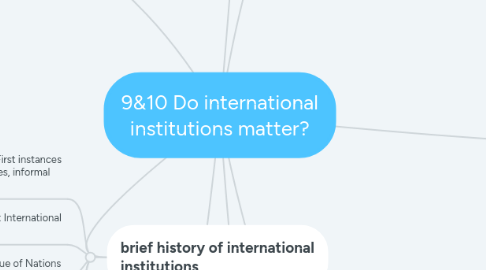
1. what are international institutions?
1.1. levels 1. informal norms 2.formal rules 3. Formal organizations
1.1.1. examples: 1. diplomatic immunity 2. Kyoto protocol, NPT(Non-Proliferation Treaty) 3. UN, NATO
1.2. International institutions: “A set of rules that stipulate the ways in which states should cooperate and compete with each other” (Mearsheimer 1994/1995)
2. brief history of international institutions
2.1. 1648 – Westphalian Peace – First instances of cooperation between States, informal norms and formal rules.
2.2. 19th c: Creation of the first International Organizations
2.3. Post-WWI: League of Nations
2.4. Post-WWII: Creation of the United Nations
2.5. Cold War: increasing number of States, challenge or opportunity for cooperation?
3. realism
3.1. relative gains
3.1.1. prisoners dillemma
3.2. five assumptions
3.2.1. anarchy
3.2.2. offensive militairy capabilities
3.2.3. uncertainty about intentions
3.2.4. strive for survival
3.2.5. strategic
3.3. main point
3.3.1. Institutions barely matter ;reflect balance of power;not a relevant source of peace.
3.3.2. because
3.3.2.1. states only consider relative gains
3.3.2.2. concerns about cheating
3.4. 3 states behaviours
3.4.1. self preservation
3.4.2. fear
3.4.3. quest for hegemony
3.5. critique
3.5.1. pessimistic
3.5.1.1. they just sit down and cry
3.5.2. dramatic view on the neccesity of war
4. International Criminal Court
4.1. purpose
4.1.1. trying individuals for
4.1.1.1. 1.genocide
4.1.1.2. 2. war crimes
4.1.1.3. 3. crimes against humanity
4.1.1.4. 4. Aggression
4.1.2. critical theory
4.1.2.1. by defining these crimes, they give awareness to the severity of them
4.2. Gegout(woman)
4.2.1. ICC is likely to make a possititve constribution to justice and peace- liberalist
4.2.2. challences for the ICC
4.2.2.1. 1. Lack of legitimacy
4.2.2.2. 2. Limited means
4.2.2.3. 3. Subject to power politics
4.2.2.4. 4. Non universal justice, tool for domination – lack of credibility.
4.3. how they open an investigation
4.3.1. three indepenent judges bring it up
4.3.2. UNSC proposes it
4.3.2.1. and need for approval if crime happened outside of the countries that rattified ICC
4.3.3. request by one member state
4.4. critique
4.5. realism vs liberaliam
4.5.1. realist argues tool for power politics
4.5.2. liberalist argues it contributes to peace and security
5. false promise of international organizations
6. liberalism
6.1. absolute gains
6.2. they accept the 5 assumptions of realism BUT
6.2.1. four pathways of cooperation
6.2.1.1. information
6.2.1.1.1. BONUS; we break prisioners dillemma
6.2.1.2. issue linkage
6.2.1.3. iteration
6.2.1.4. reduced transaction costs
6.3. main point
6.3.1. international institutions matter
6.3.1.1. cooperation is possible through 4 pathways
6.4. critique
6.4.1. relative gains might also be important
6.4.2. difficult to prove what would've happened if there were no cooperations
7. case studies
7.1. global commons
7.1.1. realist
7.1.1.1. overexploitation of the commons(climate and stuff) due to state interests(USA)
7.1.2. liberalism
7.1.2.1. overexploitation but tamed by cooperations (Paris agreement)
7.2. migrations
7.2.1. realist
7.2.1.1. international istitutions didn't fix
7.2.2. liberalist
7.2.2.1. they try to fix it and work together
8. how to cause peace
8.1. critical theory
8.1.1. changing the status quo through discourse...
8.2. collective security
8.2.1. institutions are key to manage militairy power
